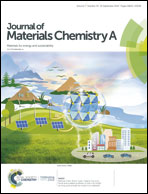A universal synthesis strategy to make metal nitride electrocatalysts for hydrogen evolution reaction†
Abstract
Transition-metal nitrides have increasingly attracted interest for use as electrocatalysts in water splitting due to their superior catalytic activity and stability. However, the development of a general and simple strategy to synthesize metal nitrides remains challenging. Here we report a facile strategy for the synthesis of various porous monometallic and bimetallic nitrides on different substrates for the hydrogen evolution reaction (HER) in alkaline media. The best monometallic nitride of CoN supported on the Ni foam delivered current densities of 10 and 100 mA cm−2 at overpotentials of 95 and 212 mV, respectively in 1 M KOH. This performance was further improved through Ni-doping to form bimetallic nitrides of NiCoN, the best of which exhibited excellent HER performance with low overpotentials of 48 and 149 mV at current densities of 10 and 100 mA cm−2, respectively, along with superior stability in 1 M KOH. The enhanced performance is mainly attributed to the synergistic effect of Co and Ni, a larger surface area with more active sites, and improved electrical conductivity for more efficient charge transfer. This work demonstrates a particularly facile and general approach to synthesize porous transition metal nitrides with advanced HER performance.



 Please wait while we load your content...
Please wait while we load your content...